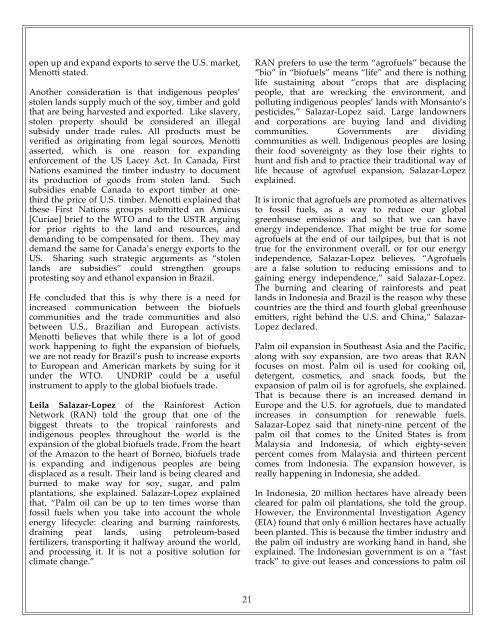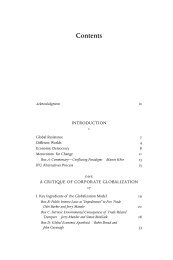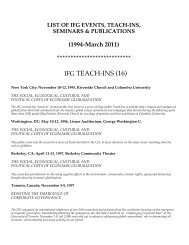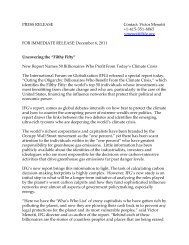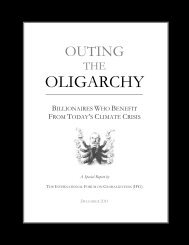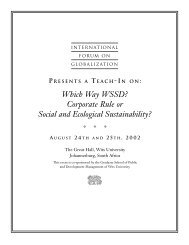UNDRIP Report - English FINAL - International Forum on Globalization
UNDRIP Report - English FINAL - International Forum on Globalization
UNDRIP Report - English FINAL - International Forum on Globalization
Create successful ePaper yourself
Turn your PDF publications into a flip-book with our unique Google optimized e-Paper software.
open up and expand exports to serve the U.S. market,<br />
Menotti stated.<br />
Another c<strong>on</strong>siderati<strong>on</strong> is that indigenous peoples’<br />
stolen lands supply much of the soy, timber and gold<br />
that are being harvested and exported. Like slavery,<br />
stolen property should be c<strong>on</strong>sidered an illegal<br />
subsidy under trade rules. All products must be<br />
verified as originating from legal sources, Menotti<br />
asserted, which is <strong>on</strong>e reas<strong>on</strong> for expanding<br />
enforcement of the US Lacey Act. In Canada, First<br />
Nati<strong>on</strong>s examined the timber industry to document<br />
its producti<strong>on</strong> of goods from stolen land. Such<br />
subsidies enable Canada to export timber at <strong>on</strong>ethird<br />
the price of U.S. timber. Menotti explained that<br />
these First Nati<strong>on</strong>s groups submitted an Amicus<br />
[Curiae] brief to the WTO and to the USTR arguing<br />
for prior rights to the land and resources, and<br />
demanding to be compensated for them. They may<br />
demand the same for Canada’s energy exports to the<br />
US. Sharing such strategic arguments as “stolen<br />
lands are subsidies” could strengthen groups<br />
protesting soy and ethanol expansi<strong>on</strong> in Brazil.<br />
He c<strong>on</strong>cluded that this is why there is a need for<br />
increased communicati<strong>on</strong> between the biofuels<br />
communities and the trade communities and also<br />
between U.S., Brazilian and European activists.<br />
Menotti believes that while there is a lot of good<br />
work happening to fight the expansi<strong>on</strong> of biofuels,<br />
we are not ready for Brazil’s push to increase exports<br />
to European and American markets by suing for it<br />
under the WTO. <str<strong>on</strong>g>UNDRIP</str<strong>on</strong>g> could be a useful<br />
instrument to apply to the global biofuels trade.<br />
Leila Salazar-Lopez of the Rainforest Acti<strong>on</strong><br />
Network (RAN) told the group that <strong>on</strong>e of the<br />
biggest threats to the tropical rainforests and<br />
indigenous peoples throughout the world is the<br />
expansi<strong>on</strong> of the global biofuels trade. From the heart<br />
of the Amaz<strong>on</strong> to the heart of Borneo, biofuels trade<br />
is expanding and indigenous peoples are being<br />
displaced as a result. Their land is being cleared and<br />
burned to make way for soy, sugar, and palm<br />
plantati<strong>on</strong>s, she explained. Salazar-Lopez explained<br />
that, “Palm oil can be up to ten times worse than<br />
fossil fuels when you take into account the whole<br />
energy lifecycle: clearing and burning rainforests,<br />
draining peat lands, using petroleum-based<br />
fertilizers, transporting it halfway around the world,<br />
and processing it. It is not a positive soluti<strong>on</strong> for<br />
climate change.”<br />
RAN prefers to use the term “agrofuels” because the<br />
“bio” in “biofuels” means “life” and there is nothing<br />
life sustaining about “crops that are displacing<br />
people, that are wrecking the envir<strong>on</strong>ment, and<br />
polluting indigenous peoples’ lands with M<strong>on</strong>santo’s<br />
pesticides,” Salazar-Lopez said. Large landowners<br />
and corporati<strong>on</strong>s are buying land and dividing<br />
communities. Governments are dividing<br />
communities as well. Indigenous peoples are losing<br />
their food sovereignty as they lose their rights to<br />
hunt and fish and to practice their traditi<strong>on</strong>al way of<br />
life because of agrofuel expansi<strong>on</strong>, Salazar-Lopez<br />
explained.<br />
It is ir<strong>on</strong>ic that agrofuels are promoted as alternatives<br />
to fossil fuels, as a way to reduce our global<br />
greenhouse emissi<strong>on</strong>s and so that we can have<br />
energy independence. That might be true for some<br />
agrofuels at the end of our tailpipes, but that is not<br />
true for the envir<strong>on</strong>ment overall, or for our energy<br />
independence, Salazar-Lopez believes. “Agrofuels<br />
are a false soluti<strong>on</strong> to reducing emissi<strong>on</strong>s and to<br />
gaining energy independence,” said Salazar-Lopez.<br />
The burning and clearing of rainforests and peat<br />
lands in Ind<strong>on</strong>esia and Brazil is the reas<strong>on</strong> why these<br />
countries are the third and fourth global greenhouse<br />
emitters, right behind the U.S. and China,” Salazar-<br />
Lopez declared.<br />
Palm oil expansi<strong>on</strong> in Southeast Asia and the Pacific,<br />
al<strong>on</strong>g with soy expansi<strong>on</strong>, are two areas that RAN<br />
focuses <strong>on</strong> most. Palm oil is used for cooking oil,<br />
detergent, cosmetics, and snack foods, but the<br />
expansi<strong>on</strong> of palm oil is for agrofuels, she explained.<br />
That is because there is an increased demand in<br />
Europe and the U.S. for agrofuels, due to mandated<br />
increases in c<strong>on</strong>sumpti<strong>on</strong> for renewable fuels.<br />
Salazar-Lopez said that ninety-nine percent of the<br />
palm oil that comes to the United States is from<br />
Malaysia and Ind<strong>on</strong>esia, of which eighty-seven<br />
percent comes from Malaysia and thirteen percent<br />
comes from Ind<strong>on</strong>esia. The expansi<strong>on</strong> however, is<br />
really happening in Ind<strong>on</strong>esia, she added.<br />
In Ind<strong>on</strong>esia, 20 milli<strong>on</strong> hectares have already been<br />
cleared for palm oil plantati<strong>on</strong>s, she told the group.<br />
However, the Envir<strong>on</strong>mental Investigati<strong>on</strong> Agency<br />
(EIA) found that <strong>on</strong>ly 6 milli<strong>on</strong> hectares have actually<br />
been planted. This is because the timber industry and<br />
the palm oil industry are working hand in hand, she<br />
explained. The Ind<strong>on</strong>esian government is <strong>on</strong> a “fast<br />
track” to give out leases and c<strong>on</strong>cessi<strong>on</strong>s to palm oil<br />
21


